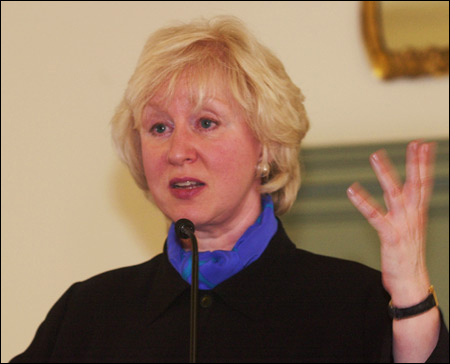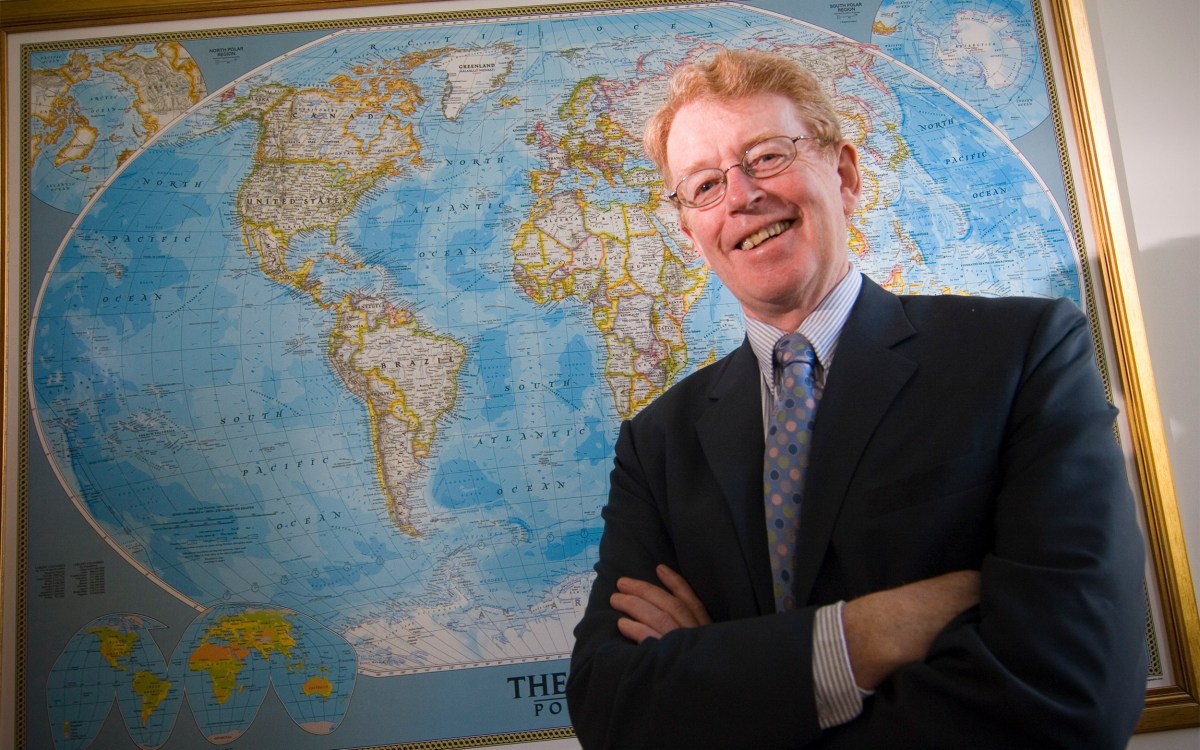Former Canadian leader Campbell addresses gender bias :
Discusses ‘If she knew then what she knows now’ with Harvard women’s group

If she had it all to do over again, former Canadian Prime Minister Kim Campbell said she’d address the issue of gender bias in political coverage head on, instead of being blindsided by it, as she was in the 1993 election that forced her out of office.
Campbell, a visiting professor of practice at the Kennedy School of Government, recently reflected on how societal attitudes toward gender – both conscious and unconscious – mold the political races and subsequent administrations of women leaders.
“The qualities people ascribe to a leader overlap almost completely with the qualities they ascribe to men,” Campbell said. “Everything a man does to be a stronger man enhances his perceived ability as a leader.”
Campbell made her comments during an hourlong lunchtime talk Monday (Feb. 24) to about 40 people gathered at the Radcliffe Institute for Advanced Study’s Cronkhite Center. Campbell’s career includes several firsts for women, including Canada’s first female prime minister, first female minister of justice, and Canada’s first female minister of defense, which also made her the first female defense minister of a NATO country.
She currently heads the Council of Women World Leaders, made up of women heads of state from around the world, and is a senior fellow of the Gorbachev Foundation of North America.
The talk was sponsored by the Committee on the Concerns of Women at Harvard and is part of their yearlong series “Making Connections across Community.”
Campbell said it was only after her 1993 defeat that she began to wonder how her treatment by the press might have colored her re-election campaign. Immediately upon returning home to Vancouver she was asked to address gender bias in her campaign in a talk to an editorial board there. She turned down the invitation, she said, partly because the whole experience was still a bit too raw, and partly because she didn’t feel she could be objective about it.
It was only later, after coming to Harvard in 1994 as a fellow at the Institute of Politics and returning in 1995 as a fellow at the Joan Shorenstein Center for the Press, Politics and Public Policy, that she began to take a look at the issue.
What she found, she said, was a large body of research on gender bias and societal expectations based on sex. What she learned from a review of her re-election campaign, she said, was that the media itself repeatedly acknowledged she was getting unfair treatment but few reporters tried to figure out why.
“A persistent theme among the media was how the media was unfair to Campbell,” Campbell said. “I now have a much better understanding about what was going on there.”
What was going on, she said, was not a sinister scheme to oust her from office, but rather reporters reacting to unconscious ideals and expectations of women that they may have been unaware they even had.
That phenomenon doesn’t just affect the media, Campbell said. Sex role stereotypes are reinforced from the time a child is born.
“The real ethical challenge [for the media] is to understand your own biases. Understand that even if you feel you’re being fair you might not be,” Campbell said.
Campbell gave a brief overview of research on gender bias, describing experiments in which orchestra auditions were conducted behind a screen to eliminate gender clues. The result was that 25 percent more women were hired.
A second experiment involved photographs of men and women of identical height, taken against an identical background. When shown to different individuals who were asked who is taller, both men and women indicated the men were taller.
“Our conscious views about gender are only a very small part of the picture,” Campbell said. “We could not function as human beings if we did not create categories or patterns. It’s an important part of human cognitive development and even survival.”
The result, Campbell said, is that the successful woman, and successful woman politicians in particular, are viewed as the exception, as an anomaly, or as a “hard-worker.” Campbell said she’d always been viewed as the exception as she held a variety of leadership positions as she grew. But it wasn’t until she was in her 20s that she realized that maybe the view she was an exception was not a good thing.
She advised women in the audience who are told they must be “hard workers” because they’re successful to fight back by replying that they’re actually quite lazy and if they hadn’t been brilliant they’d never have made it.
The gender stereotypes and biases have many ramifications for women leaders, Campbell said. They make successes more forgettable and failures tougher to overcome. They also prompt a more consensus style of leadership, compared with a command-and-control style that men are more comfortable with.
“Women cannot rely on [the power of their] office alone for people to follow their vision,” Campbell said. “It is extremely important to keep pushing the envelope because things are beginning to change.”
Campbell said there are some things she’d do differently now than in 1993. One would be to address the issue of gender head on, as she did on Monday. But she also said she would do a lot the same way, after all, she said, she did become Canada’s first female prime minister.
“[Once you get elected], whatever people think, they have to deal with you,” Campbell said.




